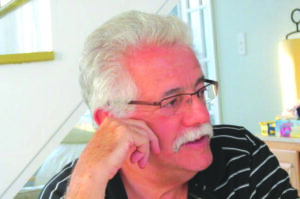
Rabbi George Stern
Parshat Ki Tassa
For me, the beauty of Jewish scholarly tradition is its emphasis on constantly examining and re-examining our texts and commentaries to be sure that we haven’t “missed something.”
Of the Torah, we are told, “Turn it, turn it, because everything is in it” (Pirkei Avot 5:22). “Turning” might superficially refer to rolling the scroll from beginning to end but, in actuality, it calls upon us to examine the Torah (and, more broadly, all of our traditions) from every conceivable angle and through various lenses. Torah remains relevant only when it is treated as a guide to understanding new situations as they arise.
A major focus of this week’s parshah, Ki Tissa, is the people’s insistence that, in Moses’ absence (he was up on Mount Sinai), Aaron create a golden calf: “When the people saw that Moses was so long in coming down from the mountain, the people gathered against Aaron and said to him, ‘Come, make us Elohim, who shall go before us, for that man Moses, who brought us from the land of Egypt — we do not know what has happened to him’” (Exodus 32:1).
The simple — and common — understanding of this verse is that the people demanded that Aaron make another god for them to worship, in violation of the commandment, “You shall have no other gods besides Me” (Exodus 20:2). I contend that a close reading of the text suggests that worshiping another god was not the reason for the calf.
Note that what the people wanted Aaron to do was make them Elohim, not some other god. Moreover, the demand came because Moses had failed to return from the mountaintop, for all intents and purposes disappearing. They feared the worst: Moses has abandoned us!
In a d’var Torah on this parshah, my granddaughter Hannah pointed out that for more than four centuries, the Israelites had lived in a country whose leader, the Pharaoh, was both a mortal and a god to be worshiped. It would be neither fair nor realistic to assume that the Israelites hadn’t been affected by the culture they lived in for 430 years.
They naturally linked Moses to God. After all, it was Moses who, upon returning to Egypt after witnessing the “burning bush,” convinced them to worship Elohim. Then he called down miraculous plagues to force Pharaoh’s hand, and at the Sea of Reeds, merely raised his arms and the waters parted. Is it any wonder that Moses seemed like a god to them?
The Israelites were ready to “have no other gods besides Me,” but not (in Moses’ absence) to abandon the need for something physical to “represent” God. They wanted to worship Elohim, but they needed a crutch. Thus Aaron says, “This [the calf] is Elohecha [your God], O Israel, who brought you out of the land of Egypt” (Exodus 32:4).
True, the Torah goes on to say that God was incensed about the calf and threatened to destroy the people, and Moses became so angry that he broke the tablets and berated Aaron. Yet the Torah also says that God and Moses entreated one another not to allow anger to lead to severe, even mortal, punishment.
Judah Halevi, 12th-century Spanish Jewish poet/philosopher, wrote in “The Kuzari,” “The children of Israel were waiting for Moses to bring them down something tangible … to focus their worship …” And indeed, Moses carved a second set of tablets that ultimately came to reside first in the ark that the Israelites carried through the desert and then in the inner sanctum of the Temple.
I suggest it is no accident that the tablets were given such a place of honor. They served as a physical reminder of God and the Exodus, even as the Torah scrolls today remind us of the origin story of our people.
Jewish intellectual tradition demonstrates that not everything (perhaps nothing) is black and white, nor is society static. Even foundational texts can and should be continually examined and reinterpreted: “Turn it, turn it, because everything is in it.” Might that be an antidote to the notion so prevalent today that there are only absolutes, only one correct way to do things?
Jews understand that disagreements aren’t inherently evil. Rather, when examined dispassionately, they can lead to common-ground solutions that respond effectively to the needs of the day.
A Philadelphia native, Rabbi Stern served a pulpit with an emphasis on tikkun olam for three decades, then returned to Philadelphia, where he directed several social justice organizations and actively engages in political advocacy. The Board of Rabbis of Greater Philadelphia is proud to provide diverse perspectives on Torah commentary for the Jewish Exponent. The opinions expressed in this column are the author’s own and do not necessarily reflect the view of the Board of Rabbis.





